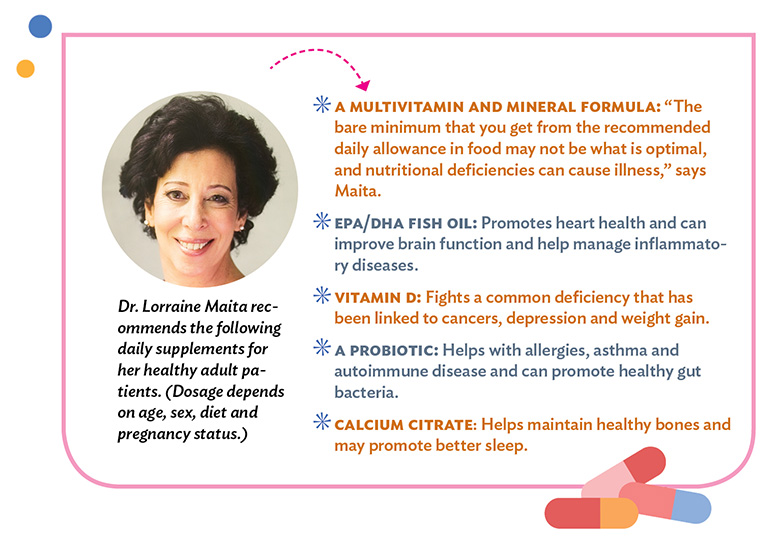
Dr. Lorraine Maita is a specialist in internal medicine with a practice in Summit. But her patients are less interested in her medical degree than in the work she does in “functional medicine”—an approach to treatment that looks at health troubles holistically. Often, treatment involves alternative therapies, including dietary supplements.
Maita wasn’t always a believer in the kinds of pills that make bold claims: St. John’s wort for mitigating PMS, matcha for promoting weight loss, gingko and ginseng for boosting memory.
“I used to thumb my nose at supplements,” she says. “I was trained in a traditional way and not a big believer.”
Then, in the 1990s, Maita read a New England Journal of Medicine study that said one in three people sought some kind of alternative care. These days, 75 percent of adults use supplements—from familiar vitamins to trendy herbal remedies—according to a 2016 survey by the Council for Responsible Nutrition, and the industry is worth $37 billion a year, according to the National Institutes of Health.
The research opened Maita’s mind to supplements. “I felt I should know more about some of the things my patients were doing, because so many of them were taking pills,” she says. “I read extensively, took classes and studied under some experts.” Supplements soon became a regular part of her treatments, along with standard pharmaceuticals.
“The proof is in the pudding,” she says. And not just for conditions that all internists treat, like diabetes (turmeric may help) and flu (echinacea is sometimes effective). Maita now calls her practice Vibrance for Life: Your Health Unleashed. Her website invites the sluggish, aged and pallid to learn, with her help, how to enjoy healthier lives “with energy, vitality, strength, stamina and confidence.”
Studies show minor wrinkles diminish with use of collagen. Maita has watched stress levels plummet (thanks to ashwagandha and other adaptogens, including aloe vera and kava kava). She has removed toxins (charcoal). She has calmed hypothyroidism (iodine). And she has eliminated the discomfort of chronic constipation (magnesium).
All of those results, she emphasizes, were achieved not just with pills, but by deploying customized wellness programs. “Supplements can help shore up your health if you’re in a difficult period,” she says. “But they’re not going to make up for a bad lifestyle.” For example, a patient eating poorly or not getting enough sleep and exercise needs more than supplements.

Not every doctor shares Maita’s faith in supplements.
“Vitamins and supplements are not going to make you healthier,” says Dr. Manny Alvarez, chairman of the OB-GYN department at Hackensack Meridian Health/Hackensack University Medical Center and a Fox-TV on-air personality (known as Dr. Manny). Supplements, he adds, may have a serious downside.
Alvarez, who lives in Cresskill, walks that statement back a little when it comes to certain health conditions, like anemia and pregnancy. Even he takes CoQ10, a supplement that acts as an antioxidant and can help certain cardiac conditions, like heart failure and high blood pressure.
“I take it because I take cholesterol medicine, or statins,” explains Alvarez, “and I know that the statins could interfere with [the body’s natural] absorption of Coenzyme Q10.”
But would he take a supplement for something other than a medical problem, like to flatten his tummy? Not a chance, he says. “There’s a lot of misinformation out there.”
Still, consumers have a powerful urge to waltz into a store and walk out with a sackful of magic bullets, such as selenium for staving off cancer; zinc for increasing sex drive; or reishi for promoting longevity. Which is why physician and New Jersey Assemblyman Herb Conaway Jr., (D-Delanco) introduced a bill in 2014-2015 requiring increased federal oversight of supplements. The bill didn’t get far; Conaway reintroduced it in 2018.
Even those who make a living selling supplements agree that some of them are junk.
“If you bought an Omega-3 fish oil at [a big-box store], you might as well flush it down the toilet,” says Karen Lauber, owner of the Health Stop, in Wyckoff. That is no reflection on fish oil, a brisk seller for Lauber. “It’s good for your brain and for learning, and it can have benefits for your skin and your heart.” The difference between the ones she sells and the kind a supplement shopper might pick up at a discount store? Hers, she says, come from reputable manufacturers and are free of mercury.
Maita and Alvarez agree that, because supplements are not regulated, it’s important to seek trusted brands. “There are a lot of companies out there that don’t adhere to quality standards and make outrageous claims,” says Maita. She investigates all the supplements she recommends.
Some supplements haven’t been sufficiently tested for Maita’s liking. For example, she won’t recommend maca, a root purported to boost energy and stamina. “I’ve seen women have a lot of breast tenderness on it,” she says. “We don’t know where it goes and we can’t control it.”
Alvarez warns that herbs can have interactions with prescribed pharmaceuticals. “People aren’t careful enough,” he says.
Despite the need for caution, it is unlikely consumers will ignore the claims of products that promise clearer skin, calmer nerves or revived libidos.
Consider CBD, the non psychoactive cannabis extract used to reduce pain and, at high enough doses, deliver a “body high.” Lauber says it’s her current best-seller. “There’s a lot of pain out there and a lot of anxiety,” she says. “People are looking for a way to feel better
